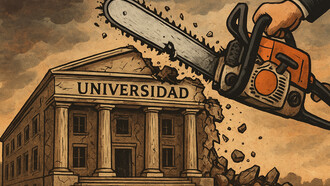Mario Sandoval arrives in France in 1985 at the age of 32. As an Argentinian officer graduated of the Federal Police School of Buenos Aires, he first worked for the private security of the firm Néral before moving rapidly into the intellectual field and university training, lecturing at the Institut des Hautes Études de l'Amérique latine between 1999 and 2005, as well as at La Sorbonne and the Université de Paris-Est Marne-la-Vallée.
Thanks to his close ties with Colombia, he gets involved in negotiating peace and the release of Ingrid Betancourt in 2008. In the meantime, the head of the Institute of High Studies on National Defense (IHEDN) is made aware of a liability linked to Sandoval's early life—which proved potentially disturbing for his institutional position. Sandoval decides to withdraw.
Previously, he crossed the path of economic intelligence and met Alain Juillet and Philippe Clerc, two leading names in this field. In 2006, the latter courageously hired him at the Assembly of French Chambers of Commerce and Industry. As a trio, they organise security and economic intelligence training courses between Latin America and Paris, and then create the French-speaking International Association for Economic Intelligence.
The destiny started to change in 2007-2008. Mario Sandoval, already in the crosshairs of Página 12 in Argentina, was first targeted by the Colombian newspaper El Tiempo (other link), then again by Página 12 in 2008. He is openly accused of having taken part in the crimes of the Argentine dictatorship between 1976 and 1983. There was panic in the corridors of the French ministries, which publicly got wind of the affair. Mario Sandoval is aware of the kind of manoeuvring that is beginning to surround him.
Twenty years earlier, his native country has only scratched the surface of its fratricidal confrontation between revolutionary Castro-Communist factions and the Argentine state. The armed clash ended in 1983, but the war turned into a judicial and cognitive war. In 1982, the Military Junta, victorious in the armed struggle, lost to England in the Malvinas War (Falklands)—a war, it should be remembered, subtly provoked by London on the South Georgia’s island.
To keep Buenos Aires below the waterline after 1983, British intelligence helped the ex-revolutionaries criminalise the armed forces and try them under civil law. This marked the start of a 40-year political warfare, punctuated by fabricated trials for the benefit of hand-picked victims.
State officials committed intolerable crimes in the service of "state terrorism", urged human rights organizations in unison. Crimes have been committed on both sides, of course. The decisive mistake made by the armed forces was to fight an irregular force without a clearly established ethical and legal framework. The administrative vacuum was then exploited by the adversary, who turned history on its head and attacked the military, wrongly accused of “crimes against humanity”.
In 2013, Mario Sandoval first defended himself against media defamation by taking Argentina's leaders to court. In 2012, CELS, an NGO headed by triple agent Horacio Verbitsky, and generously funded by London and Washington, took the initiative and accused Sandoval of having participated in the repression (on the grounds of “596 cases of torture followed by death and aggravated illegal deprivation of liberty”).
The arguments put forward in the case are widely criticised as aberrant and unfounded. Mario Sandoval, for his part, claims to have been an analyst in the Argentine Ministry of the Interior between 1976 and 1979, before being removed from his post by the government in 1983. In 2019, he took the initiative of creating a support committee whose website is rich in analysis.
From then on, an avalanche of offensive information, rigorously paced, falls on the Franco-Argentinian, as well as on his French collaborators. Mario Sandoval was extradited from France in 2019, then sentenced in December 2022 to 15 years in prison. His fate joins those of some 3,000 political prisoners selectively prosecuted as part of this cognitive and judicial warfare.














